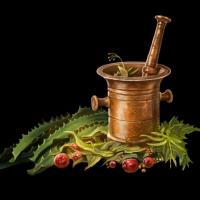Apothecary


In general use, herbs are any plants used for flavoring, food, medicine, or perfume. Culinary use typically distinguishes herbs as referring to the leafy green parts of a plant (either fresh or dried), from a "spice", a product from another part of the plant (usually dried), including seeds, berries, bark, roots and fruits. Herbs have a variety of uses including culinary, medicinal, and in some cases spiritual usage. General usage of the term "herb" differs between culinary herbs and medicinal herbs. In medicinal or spiritual use any of the parts of the plant might be considered "herbs", including leaves, roots, flowers, seeds, resin, root bark, inner bark (and cambium), berries and sometimes the pericarp or other portions of the plant.
Herbs are used in many religions. For example, myrrh (Commiphora myrrha) and frankincense (Boswellia spp) in Christianity and Hellenismos, the Nine Herbs Charm in Anglo-Saxon paganism, the neem tree (Azadirachta indica) by the Tamils, holy basil or tulsi (Ocimum tenuiflorum) in Hinduism, and many Rastafarians consider cannabis (Cannabis sp) to be a holy plant. Siberian Shamans also used herbs for spiritual purposes. Plants may be used to induce spiritual experiences for rites of passage, such as vision quests in some Native American cultures. The Cherokee Native Americans use both white sage and cedar for spiritual cleansing and smudging.
If you want to dramatically improve all aspect of your health, herbs and herbal supplements can help. Herbs are a natural means of preventing and curing many types of ailments and diseases. About 25% of prescription medicine has at least one herbal component in it. These are most often potent herbal extracts. An example would be aspirin, that was first created from white willow bark.
It’s important to remember that herbs are not medicine. They are food. A very high quality food that contains a highly assimilable form of vitamins, minerals and elements that balance the body in a beneficial manner. This fact makes herbs generally much safer to take that prescription drugs.
It seems that every day modern medicine is telling us to take more prescription drugs. Yes, there’s a drug for everything. While some drugs are very useful and do save lives, there is a limit to how many of these the body can withstand. I believe that taking herbs whenever possible is the better and more healthy way to go. There are many herbs that work as well or better than prescription medicine for certain conditions. An example would be taking ginger rather than Dramamine. In scientific tests, ginger was found to be more effective in preventing motion sickness.
Since herbs are food, there are generally no dangerous side effects of using them in there natural state. If they are herbal extracts, they are more potent then the raw herb and should be taken in smaller doses to get the desired effects. Some herbs have a cleansing and detoxifying effect on the body and can cause diarrhea and nausea if taken in large quantity. Don’t worry. It’s good to cleanse the body of toxins. Just start off slowly and you’ll get the best long term results.
IMPORTANT: Never take any herb or health supplement without first consulting your doctor. Never take any herb or supplement without your doctor’s consent if you are pregnant, nursing or trying to get pregnant. Never give herbs or health supplements to children without first talking to their doctor. The herbs and supplements mentioned are not intended to cure, treat, diagnose or prevent disease. Always play it safe.